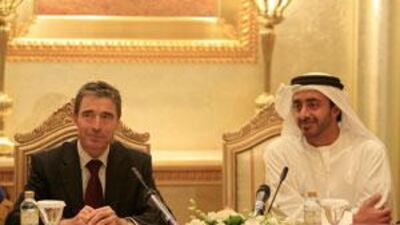ABU DHABI // Sheikh Abdullah bin Zayed, the Minister of Foreign Affairs, invited Nato yesterday to co-operate with the Gulf in tackling unconventional threats to security, including terrorism and internet warfare.
The nature of threats in the world had changed and called for specialised responses, he said. "The world has been witnessing rapid and deep changes, including astonishing technical developments, changes in the field of information and communications, and changes to conventional military confrontations in the form of asymmetric and cyber wars," Sheikh Abdullah said. He was addressing 60 officials from the North Atlantic Treaty Organisation's 28 nations, which include the US, most members of the EU and Turkey.
The gathering, part of the Istanbul Co-operation Initiative (ICI), launched in 2004, also brought together 200 government officials and experts from the GCC states, and representatives of international organisations. Similar meetings have been held in the past two years in Kuwait and Bahrain. "We call upon you for co-operation to confront these changes on the regional and international level," said Sheikh Abdullah.
"Moving from this understanding of international changes, the UAE's policy believes in developing a more comprehensive concept of security in the region, taking into account that the threats faced by the area do not only require regional attention, but also international." Sheikh Abdullah witnessed the signing of an agreement between the UAE and Nato on the security and protection of classified information.
Co-operation between the Emirates and Nato falls under the framework of the ICI. The initiative, of which all the GCC nations except Saudi Arabia and Oman are signatories, seeks to improve security co-operation to combat terrorism, prevent the proliferation of weapons of mass destruction and counter the illegal flow of arms, drugs and people. It acts as a framework for bilateral security and strategic consultations between Nato and individual Gulf members of the initiative, but there are hopes that consultations will grow to a multilateral level.
Analysts said the ICI was not an expansion of Nato's sphere of influence, rather a precursor to extending the organisation's security co-operation. Saudi Arabia and Oman have yet to join because, according to Dr Mustafa Alani, senior adviser and security programme director at the Gulf Research Centre in Dubai, the agreement did not contain the trappings of a genuine military alliance, such as the guarantees for collective defence that are incumbent upon Nato members.
For years, however, the UAE has established strong alliances with individual Nato members. It signed a defence co-operation agreement with the US in 1994. A similar agreement was signed with France in 1995 and was renewed in April when President Nicolas Sarkozy opened a 500-troop French base in Abu Dhabi. Nato officials have repeatedly said the idea behind the ICI was to initiate dialogue between Nato and individual GCC states and not necessarily to establish a traditional military alliance.
Sheikh Abdullah said dialogue was vital. "Given the security scenario in the region, it is imperative that all efforts are explored to overcome both short-term and long-term risks," he told WAM, the official news agency, on Wednesday. Yesterday, the Foreign Minister told Nato officials that the UAE had done the best it could since joining the ICI to tackle common security through continued "consultations and co-operation, in the fields of defence preparations, boosting regional and international efforts against terrorism as well as taking part in peacekeeping missions".
He emphasised the UAE's desire to continue "close co-operation" with its ICI partners. "At the same time, we are looking forward to enriching this initiative with new tracks to tackle new challenges and common threats, in a way that contribute to peace and security in its comprehensive understanding," he said. At a press conference he also addressed Iran's part in maintaining security in the region.
"Iran is an important neighbour for the Emirates; it has its status in the region that we respect," Sheikh Abdullah said. "We respect its history and civilisation. But Iran also must appreciate the area surrounding it not only by clarifying its nuclear intentions but also by stopping its intervention in the area, by stopping pushing certain parties, Arab and non-Arab, to interfere in some countries.
"This dialogue with Iran will continue diplomatically but Iran should carry out a serious initiative to bring concern over its nuclear [programme] or interference in Arab issues to a halt. "Just like everyone condemned the terrorist attack that happened in Iran, Iran should follow suit by refusing to do practices that it doesn't accept for itself." In a keynote address, Anders Fogh Rasmussen, Nato's secretary general, expressed the organisation's interest in developing the ICI by upgrading dialogue from bilateral to multilateral.
"I believe there is scope for further developing the ICI as a genuine framework for multilateral political consultation on the increasingly complex security challenges facing all our nations," he said. He also spoke of further enhancing the initiative through a programme, which, he said, was still under discussion, that would give "further structure and focus to the growing range of practical areas in which we co-operate - from the fight against terrorism, through military education and training, to civil emergency planning".
Mr Rasmussen said the alliance had common interest with the ICI states in fostering security and stability in Iraq and Afghanistan, keeping Somalia and Sudan "from slipping into deeper chaos", and securing energy and trade routes. @Email:mhabboush@thenational.ae

